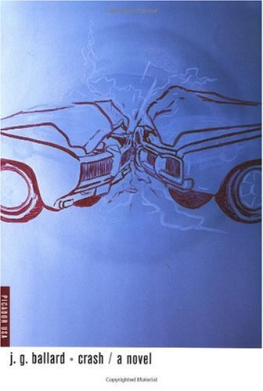James Ballard - The Garden Of Time
Here you can read online James Ballard - The Garden Of Time full text of the book (entire story) in english for free. Download pdf and epub, get meaning, cover and reviews about this ebook. genre: Prose. Description of the work, (preface) as well as reviews are available. Best literature library LitArk.com created for fans of good reading and offers a wide selection of genres:
Romance novel
Science fiction
Adventure
Detective
Science
History
Home and family
Prose
Art
Politics
Computer
Non-fiction
Religion
Business
Children
Humor
Choose a favorite category and find really read worthwhile books. Enjoy immersion in the world of imagination, feel the emotions of the characters or learn something new for yourself, make an fascinating discovery.

- Book:The Garden Of Time
- Author:
- Genre:
- Rating:3 / 5
- Favourites:Add to favourites
- Your mark:
- 60
- 1
- 2
- 3
- 4
- 5
The Garden Of Time: summary, description and annotation
We offer to read an annotation, description, summary or preface (depends on what the author of the book "The Garden Of Time" wrote himself). If you haven't found the necessary information about the book — write in the comments, we will try to find it.
The Garden Of Time — read online for free the complete book (whole text) full work
Below is the text of the book, divided by pages. System saving the place of the last page read, allows you to conveniently read the book "The Garden Of Time" online for free, without having to search again every time where you left off. Put a bookmark, and you can go to the page where you finished reading at any time.
Font size:
Interval:
Bookmark:
THE GARDEN OF TIME
by
J.G. Ballard
Towards evening, when the great shadow of the Palladian villa filled the terrace, Count Axel left his library and walked down the wide rococo steps among the time flowers. A tall, imperious figure in a black velvet jacket, a gold tie-pin glinting below his George V beard, cane held stiffly in a white-gloved hand, he surveyed the exquisite crystal flowers without emotion, listening to the sounds of his wifes harpsichord, as she played a Mozart rondo in the music room, echo and vibrate through the translucent petals.
The garden of the villa extended for some two hundred metres below the terrace, sloping down to a miniature lake spanned by a white bridge, a slender pavilion on the opposite bank. Axel rarely ventured as far as the lake, most of the time flowers grew in a small grove just below the terrace, sheltered by the high wall which encircled the estate. From the terrace he could see over the wall to the plain beyond, a continuous expanse of open ground that rolled in great swells to the horizon, where it rose slightly before finally dipping from sight. The plain surrounded the house on all sides, its drab emptiness emphasising the seclusion and mellowed magnificence of the villa. Here, in the garden, the air seemed brighter, the sun warmer, while the plain was always dull and remote.
As was his custom before beginning his regular evening stroll, Count Axel looked out across the plain to the final rise, where the horizon was illuminated like a distant stage by the fading sun. As the Mozart chimed delicately around him, flowing from his wifes graceful hands, he saw that the advance columns of an enormous army were moving slowly over the horizon. At first glance, the long ranks seemed to be progressing in orderly lines, but on closer inspection, it was apparent that, like the obscured detail of a Goya landscape, the army was composed of a vast confused throng of people, men and women, interspersed with a few soldiers in ragged uniforms, pressing forward in a disorganised tide. Some laboured under heavy loads suspended from crude yokes around their necks; others struggled with cumbersome wooden carts, their hands wrenching at the wheel spokes; a few trudged on alone; but all moved on at the same pace, bowed backs illuminated in the fleeting sun.
The advancing throng was almost too far away to be visible, but even as Axel watched, his expression aloof yet observant, it came perceptibly nearer, the vanguard of an immense rabble appearing from below the horizon. At last, as the daylight began to fade, the front edge of the throng reached the crest of the first swell below the horizon, and Axel turned from the terrace and walked down among the time flowers.
The flowers grew to a height of about two metres, their slender stems, like rods of glass, bearing a dozen leaves, the once transparent fronds frosted by the fossilised veins. At the peak of each stem was the time flower, the size of a goblet, the opaque outer petals enclosing the crystal heart. Their diamond brilliance contained a thousand facets, the crystal seeming the drain the air of its light and motion. As the flowers swayed slightly in the evening air, they glowed like flame-tipped spears.
Many of the stems no longer bore flowers, and Axel examined them all carefully, a note of hope now and then crossing his eyes as he searched for any further buds. Finally he selected a large flower on the stem nearest the wall, removed his gloves and with his strong fingers snapped it off.
As he carried the flower back on to the terrace, it began to sparkle and deliquesce, the light trapped within the core at last released. Gradually the crystal dissolved, only the outer petals remaining intact, and the air around Axel became bright and vivid, charged with slanting rays that flared away into the waning sunlight. Strange shifts momentarily transformed the evening, subtly altering its dimensions of time and space. The darkened portico of the house, its patina of age stripped away, loomed with a curious spectral whiteness as if suddenly remembered in a dream.
Raising his head, Axel peered over the wall again. Only the furthest rim of the horizon was lit by the sun, and the great throng, which before had stretched almost a quarter of the way across the plain, had now receded to the horizon, the entire concourse abruptly flung back in a reversal of time, and now appearing to be stationary.
The flower in Axels hand had shrunk to the size of a glass thimble, the petals contracting around the vanishing core. A faint sparkle flickered from the centre and extinguished itself, and Axel felt the flower melt like an ice-cold bead of dew in his hand.
Dusk closed across the house, sweeping its long shadows over the plain, the horizon merging into the sky. The harpsichord was silent, and the time flowers, no longer reflecting its music, stood motionlessly, like an embalmed forest.
For a few minutes Axel looked down at them, counting the flowers which remained, then greeted his wife as she crossed the terrace, her brocade evening dress rustling over the ornamental tiles.
What a beautiful evening, Axel. She spoke feelingly, as if she were thanking her husband personally for the great ornate shadow across the lawn and the dark brilliant air. Her face was serene and intelligent, her hair, swept back behind her head into a jewelled clasp, touched with silver. She wore her dress low across her breasts, revealing a long slender neck and high chin. Axel surveyed her with fond pride. He gave her his arm and together they walked down the steps into the garden.
One of the longest evenings this summer, Axel confirmed, adding: I picked the perfect flower, my dear, a jewel. With luck it should last us for several days. A frown touched his brow, and he glanced involuntarily at the wall. Each time now they seem to come nearer.
His wife smiled at him encouragingly and held his arm more tightly.
Both of them knew that the garden was dying.
Three evenings later, as he had estimated (though sooner than he secretly hoped), Count Axel plucked another flower from the time garden.
When he first looked over the wall the approaching rabble filled the distant half of the plain, stretching across the horizon in an unbroken mass. He thought he could hear the low, fragmentary sounds of voices carried across the empty air, a sullen murmur punctuated by cries and shouts, but quickly told himself that he had imagined them. Luckily, his wife was at her harpsichord, and the rich contrapuntal patterns of a Bach fugue cascaded lightly across the terrace, masking other noises.
Between the house and the horizon the plain was divided into four huge swells, the crest of each one clearly visible in the slanting light. Axel had promised himself that he would never count them, but the number was too small to remain unobserved, particularly when it so obviously marked the progress of the advancing army. By now the forward line had passed the first crest and was well on its way to the second; the main bulk of the throng pressed behind it, hiding the crest and the even vaster concourse spreading from the horizon. Looking to left and right of the central body, Axel could see the apparently limitless extent of the army. What had seemed at first to be the central mass was no more than a minor advance guard, one of many similar arms reaching across the plain. The true centre had not yet emerged but, from the rate of extension, Axel estimated that when it finally reached the plain it would completely cover every metre of ground.
Axel searched for any large vehicles or machines, but all was amorphous and uncoordinated as ever. There were no banners or flags, no mascots or pike-bearers. Heads bowed, the multitude pressed on, unaware of the sky.
Suddenly, just before Axel turned away, the forward edge of the throng appeared on top of the second crest, and swarmed down across the plain. What astounded Axel was the incredible distance it had covered while out of sight. The figures were now twice the size, each one clearly within sight.
Font size:
Interval:
Bookmark:
Similar books «The Garden Of Time»
Look at similar books to The Garden Of Time. We have selected literature similar in name and meaning in the hope of providing readers with more options to find new, interesting, not yet read works.
Discussion, reviews of the book The Garden Of Time and just readers' own opinions. Leave your comments, write what you think about the work, its meaning or the main characters. Specify what exactly you liked and what you didn't like, and why you think so.






